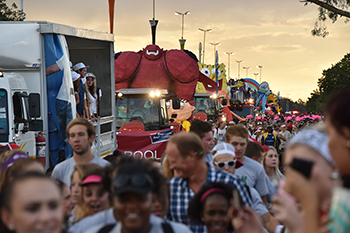Perhaps the residences Armentum and Emily Hobhouse were thrown into the deep end, but they still wanted to prove a point.
This is according to Hanko Minnaar, Residence Committee member for Rag at Armentum, shortly after the residences were announced as overall float winners of the University of the Free State (UFS).
According to Minnaar, Emily Hobhouse and Armentum overcame the challenge of building a float as a two-residence team, while most of the other hostels were in teams of three.
On 30 January 2016, after about two weeks of hard work and sweat, the residence twosome was named the winner at the Bloemfontein Campus.
“I am very proud. We couldn't have asked for more,” Minnaar said, after the residences Armentum and Emily Hobhouse celebrated their victory with house songs. “Anything is possible through teamwork.”
Tom and Jerry, Olaf and a Steri Stumpie
The theme for this year was “Cartoons, Animation, and Children's Snacks”. Among other items, Armentum and Emily Hobhouse had Tom and Jerry, Olaf from Frozen, a Steri Stumpie, and a box of Astros on their float.

Photo: Charl Devenish |
“We thought hard about what we wanted,” Minnaar said.
“We also asked some children, and they said that Tom and Jerry is a favourite, and Olaf has always been a winner as well. And Steri Stumpies, of course. Who doesn't like Steri Stumpies?” The residences Marjolein, Veritas, and Akasia were second overall, with Karee, Vergeet-My-Nie, and Sonnedou third.
Colourful processions
The events of the day started off with a morning procession from the Pelonomi Hospital to the Twin City Mall in Heidedal, where students and the community celebrated together, and meals were distributed.
The evening procession, from the Tempe robot in Nelson Mandela Drive to the Old Grey Sports Grounds, was greeted by hordes of spectators along the way.
Artists and Co captivate audience
In the evening, music lovers were entertained at Old Grey Sports Grounds by the legendary artists Vusi Mahlasela, the talented Karen Zoid, and an energetic Francois van Coke.
Local bands, Rise in Red and Simple Stories, added to the excitement. To top it all off, a special laser show made for a colourful visual bonus, coupled with great sound.
2016 Float results
Rag photo gallery